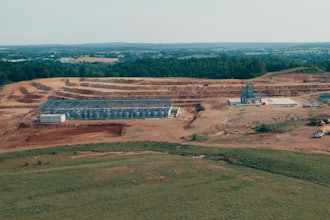AUSTIN, Texas (AP) — With temperatures now soaring into the 100s, the Texas Public Utility Commission is set to vote Thursday on raising the price cap on wholesale electricity rates by 50 percent later this summer, a move advocates hope would spur construction of new power plants to help the state avoid rolling blackouts and meet future energy demands.
The state's large industrial users warn such a move could raise wholesale market costs by billions of dollars, and consumer groups worry that will eventually trickle down to monthly household electric bills for most Texans.
And Thursday's vote could be just the start. Commissioners are considering, but aren't expected to vote on, tripling the wholesale price starting in summer of 2013.
The idea behind the price boost is that the lure of new profits would encourage investors to build more power plants. But critics warn that electric providers could just pocket the money and not build any new plants in an effort to make more money by keeping supply low during high-demand summer and winter months.
"There's no guarantee" of new construction, said Tim Morstad, associate state director for AARP-Texas. "They're breaking out the blank check for power companies. Slow down."
But the three-member utility commission appears headed toward approving a wholesale price increase. The sticking point seems to be on when the hike would take effect.
Commissioners, appointed by Republican Gov. Rick Perry, will vote on a plan to raise the wholesale cap from the current $3,000 per megawatt-hour to $4,500 starting Aug. 1. The cap increase would affect wholesale rates within the Electric Reliability Council of Texas electric grid, which covers most of the state except for El Paso, parts of the Panhandle and points in northeast and southeast Texas.
ERCOT warns that without additional generating capacity, the state would soon not be able to keep up with demand. Luminent Energy Co., a private utility, supports the increase, saying it would send "a strong signal" to investors that future prices will support building new generating facilities.
Utility Commission Chairwoman Donna Nelson favors the Aug. 1 price increase to encourage investment in new power plants as soon as possible.
Commissioner Ken Anderson also appears to favor raising the price cap, but not this year. He argues that no one is going to build a new plant by Aug. 1. If higher prices hit this summer, power companies will be "carting money away not in wheel barrows, but in Mack trucks," Anderson said at the commission's April 12 meeting.
"I don't know what signals it sends this summer, other than panic," Anderson said.
Although electric providers typically sign long-term contracts for energy at a set price, they often fill in gaps on high-usage days by purchasing electricity on the "spot market," where prices are set several times an hour. That market can be compared to buying and selling on the stock market, where prices can be determined by sharp increases in demand and shortages.
Texas Industrial Energy Consumers, which includes refineries and chemical manufacturers, warned that a sudden rate increase could create instability in electric pricing and drive smaller electric retail providers out of business.
"These are staggering numbers," the industrial group wrote in comments on the proposed Aug. 1 wholesale price increase.
What no one seems to have a handle on is how a wholesale price increase could eventually result in higher household electric bills.
Public Utility Commission spokesman Terry Hadley said the agency hasn't done a study of the potential impact on the average Texan. Hadley said much of Texas' retail electric market is based on contracts where retail providers offer household customers long-term contracts at set rates. How those companies adjust to a wholesale price increase will depend on their business plan.
"It does bring more risk to the retail provider," Hadley said.
As for the hope that an increase in profits would spur investment in new power plants, Hadley said the PUC couldn't make any promises.
"In the competitive market, generators handle the risk (of building) themselves," Hadley said.
National utility consultant Robert McCollough of Portland, Ore., said Texas would be running "a bizarre experiment" if it believes a rate hike would spur new investment in power plants.
"A bank wants a steady revenue stream. What you have in Texas is an unsteady revenue stream. Everybody makes all their money on bad days," he said. "Unless you're the king of Saudi Arabia financing this out of the household budget, (building power plants) is not going to happen."
Three state lawmakers also have expressed concern. Democratic Sen. Rodney Ellis of Houston and Reps. Rafael Anchia of Dallas and Wendy Davis of Fort Worth questioned whether the higher wholesale price would give Texans anything for their money in the future.
"It would indeed be troubling to see Texas families pay higher rates and still face the threat of rolling blackouts," without new power plants, Ellis wrote to the commission.


















